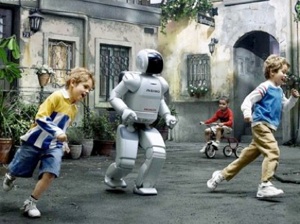

IJCAI 2011 Workshop on
Agents Learning Interactively
from Human Teachers
(ALIHT)
July 16-17, 2011
Barcelona, Spain
As intelligent robotic and software agents populate everyday human environments, they will need the ability to adapt. For such agents, human teachers present a narrow but critical learning environment. Research in interactive learning seeks to enable agents to learn from human instruction, harnessing human expertise to learn tasks and customizing behavior to match human preferences.
Machines cannot be imbued by their designers with all of the knowledge and skills that they will need to serve useful, long-term roles in our dynamic world. If humans and machines are to work together in challenging environments, then machines must be able to learn quickly from any knowledgeable human, not just expert programmers. The environments in which humans act are highly diverse and constantly changing — whether at home, in the office, or out in the field. Even a machine with exhaustive background knowledge must be customized for the particular environment in which it acts.
Between humans, the interactive student-teacher framework is known to be effective and, furthermore, is familiar to every human; even young children teach one another games and novel skills. Endowing machines with human-like learning capabilities allows humans to teach such machines as they would teach other humans and thus exploits skills that humans already possess. Another strength of an interactive learning approach is in the generality of the student-teacher mechanism; namely, that it might be applied to a wide range of tasks with minimal, ideally no, modification or specialization.
The goal of this IJCAI 2011 workshop, following the 2010 ALIHT workshop at AAMAS, is to increase awareness and interest in interactive learning methods and to foster collaboration between researchers across many disciplines. A further goal is to take steps toward identifying an organizing structure that encompasses existing and future work on agents that learn interactively from human teachers. We are seeking broad participation from researchers in the areas of:
-
•Artificial Intelligence
-
•Learning from Demonstration
-
•Teachable Agents
-
•Education
-
•Human-Computer Interaction
-
•Human-Robot Interaction
-
•Intelligent User Interfaces
-
•Developmental Psychology
-
•Adaptive systems
-
•Cognitive Science
-
•Computer Games
-
•Other related fields